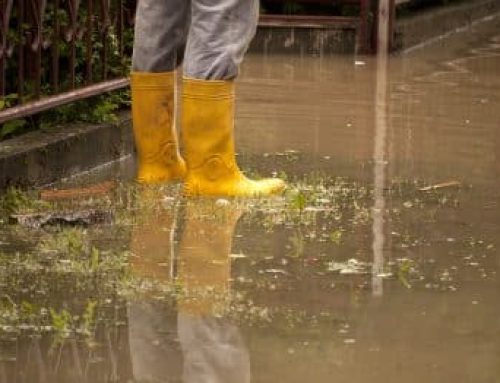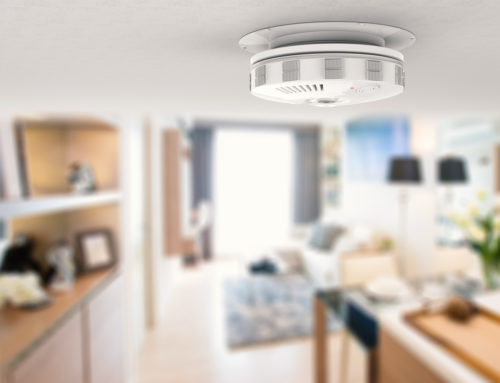To attract the best tenants and beat out the competition, you may want to offer unique rental amenities. Some common perks may include a spacious kitchen, upgrades to flooring and countertops, or perhaps lawn service built into the cost of the monthly rent. During the summer season, some investors highlight decks, pools, or maybe even a tree house.
Adding a trampoline or quality play equipment to the backyard may be nice for a family. However, these recreational items can also present some serious risks. The question is, does the prospective fun outweigh the potential danger?
Decks
Benefits for Your Tenant
Decks are one of the more common rental property amenities. A beautiful deck provides a nice place to enjoy a morning coffee or breakfast, a fun place to entertain friends and family for dinners or a hangout, or a place to get some R&R or a suntan. The bottom line, decks extend the living space to the outdoors without the risk of getting all itchy!
Injuries and Stats
- A recent study by the Consumer Product Safety Commission (CPSC) estimates that between 2016 and 2019, there were around 2,900 injuries and two deaths associated with the collapse or failure of decks, balconies, and porches.
- The CPSC also notes that around 90% of injuries related to decks and porches are attributable to reasons other than collapse or failure. One of the most common is falls from a deck or porch, due to things like faulty railings, poor lighting, slick surfaces, or the negligence of the person who fell.
- The North American Deck and Railing Association (NADRA) estimates that with more than 60 million decks in the United States, around 30 million are past their useful life and should be replaced or repaired.
Risks and Problem Areas
- Any deck or porch made of wood will eventually fail and need to be replaced. Wooden decks have an average life expectancy of 10-15 years depending on climate and level of maintenance.
- Poor construction is the number one reason for deck failure. The most common point of failure for decks is at the connection to the house. They often fail because the deck is not connected to the house by the proper method.
- The second highest cause of deck failure is wood rot. When the moisture content in wood reaches 19%, rot begins. Treated wood lasts longer, but it will also eventually rot.
- Reports from people who experience deck collapse from rot say there is no warning. The deck doesn’t creak or moan – it simply collapses.
Insurance Coverage
If a deck fails suddenly and someone is injured, you may have coverage to replace the structure itself if that deck failure isn’t related to Wear-and-Tear. Wear-and-Tear is a standard exclusion in all property insurance policies as insurance is intended to cover sudden, unforeseen events – insurance is not intended to reimburse you for routine maintenance expenses.
As for covering someone’s injuries, if they find you, the property owner, liable for the deck failure, your insurance can help cover an injured third party’s medical expenses. In that case, it may also reimburse you for any legal expenses for defense. However, if the cause of the deck collapse was faulty construction and you are not liable, you’d better be sure your contractor was properly insured. In that case, their General Liability insurance comes into play as they are the party at fault.
How to Avoid a Disaster
As a part of the inspection process, before you purchase a property, a deck should be checked for various items such as its structural integrity, railing size, strength, hardware type and condition, staircase issues, and general wear and tear such as splintered deck boards or loose fasteners. If any of these items are not in good condition, they may need to be repaired, or if the whole deck is in disrepair, it may be time to replace it. Decks need to be checked every year, and any necessary repairs must be promptly made to avoid injuries. Also, make sure anyone you hire is properly licensed and insured.
Pools
Benefits for Your Tenant
Most people like pools as a rental amenity. They provide a refreshing place to escape the summer heat, health benefits if you’re the lap-swimming or pool volleyball type, and a fun place to socialize. Whether it’s looking forward to lounging poolside with a good book or seeing how long you can hold your breath underwater, the opening of the pool season is a time of great anticipation.
Injuries and Stats
- According to a report from the CPSC, “there were, on average, an estimated 6,300 pool- or spa-related, hospital emergency department (ED)-treated, nonfatal drowning injuries each year for 2019 through 2021, and 389 pool- or spa-related fatal drownings reported per year for 2017 through 2019, involving children younger than 15 years of age.”
- The same report states that an average of 80% of the nonfatal drowning injuries from 2019-2021, and 73% of the reported fatal drownings from 2017 through 2019, involved children younger than 5 years of age.
- From 2017 to 2019, 67% of reported pool or spa drownings in a pool or spa occurred in residential locations.
Risks and Problem Areas
- Pools are considered an “attractive nuisance” – an item that is so interesting that it would entice a child into entering another’s property.
- If you do not abide by local regulations regarding these nuisances, you may be held responsible if someone is injured on your property.
- Something like neglecting to put on a pool cover can have fatal consequences.
Insurance Coverage
Insurance policies can vary greatly on how they handle coverage for pools. Some policies exclude coverage for both damages to the pool itself and any injuries associated with the pool entirely. Other policies may offer some limited coverage for an additional cost. Bottom line, you cannot assume that coverage for your pool is included in your policy, or for that matter, the above-ground pool your tenant decides to erect a week after they move in.
How to Avoid a Disaster
To eliminate the risk entirely, some investors will simply fill in a pool if a property they purchase has one. However, if the property is in a neighborhood where that amenity is expected, a different approach may need to be taken. You will want to make sure that you are in compliance with any local regulations regarding pools. Some require fencing around the pool, depth markings around the sides of the pool deck, and life-saving equipment to be in working order at all times the pool is “open.” If you invest in a small apartment complex that has a pool, bear in mind that extra security measures may be required by law, so educate yourself and follow them carefully!
Trampolines and Play Equipment
Benefits for Your Tenant
Trampolines can be fun for the whole family and playsets can be a lot of fun for the kiddos. Getting fresh air is good for the soul and having play equipment in the backyard be it for the “bigs” or “littles” can lead to a lot of laughter and good family memories.
Injuries and Stats
- From 2009-2014, an estimated 243,000 injuries associated with playground equipment were treated each year in emergency departments, reports the CPSC.
- In addition to those injuries, 80,000 people in the U.S. are injured on trampolines each year.
- More than 99% of pediatric trampoline injuries occur on privately owned trampolines located mostly at private residences.
- Playground equipment injuries most commonly occur from using swings, slides, or a composite play structure.
Risks and Problem Areas
Common injuries include:
- Broken bones (where surgery is sometimes needed)
- Concussions and other head injuries
- Sprains/strains
- Bruises, scrapes, and cuts
- Head and neck injuries (which can lead to permanent paralysis or death)
Tree Houses and Zip Lines
You may encounter these rental property amenities as well, and although they may be fun, they also bring the possibility of severe to life-threatening injuries should someone fall or, in the case of the zip line, smack into the tree at the end of the line with increased speed. There aren’t typically local codes that guide the construction of these items, so your safest bet is to remove them if you purchase a house with them included.
Insurance Coverage
Often, insurance policies will exclude coverage for physical damage to “Outdoor Equipment” and any injuries sustained while using a trampoline or other play equipment. You will need to read carefully to see if your policy has any restrictions on coverages relating to these items. If you aren’t sure or are confused about what coverage you do or do not have, don’t wait for something to happen – contact your agent!
How to Avoid a Disaster
Even though it sounds like a downer, trampolines and play equipment may be something you’ll want to consider barring from your property’s yard. The risk is very high for these items, and you may be held liable for someone getting injured on your property, even if the play equipment belongs to your tenant. Always be sure you specify in your lease if this equipment is allowed. Go over this section with tenants and have them initial the lease to demonstrate you’ve reviewed it together.
Recap
Keep in mind the risks associated with these common rental property amenities so you can make wise decisions about providing or allowing these items at your properties. We advise you to:
- Consider the risks and set your rules for pools and outdoor equipment well in advance of allowing someone to step foot on your property.
- Become familiar with your insurance coverage regarding these items. If you don’t understand something or have questions, consult your Client Service Advisor.
- Carefully inspect all outdoor equipment before purchasing a property and make any necessary repairs before placing a tenant. Or, remove the risk altogether.
- Consult legal counsel regarding “attractive nuisances” and how the law handles such items in your area. Take the appropriate measures to abide by those laws.
- Be very specific in your lease about how pools and outdoor equipment are to be used and who is responsible for upkeep. If you don’t allow these items, spell that out clearly.
- Review the entire lease with your future tenant and have them initial by those items to signify they understand the terms of the lease….and then make sure you enforce it!






